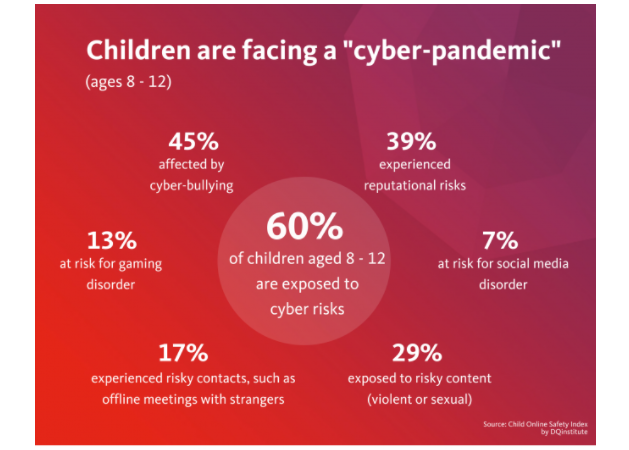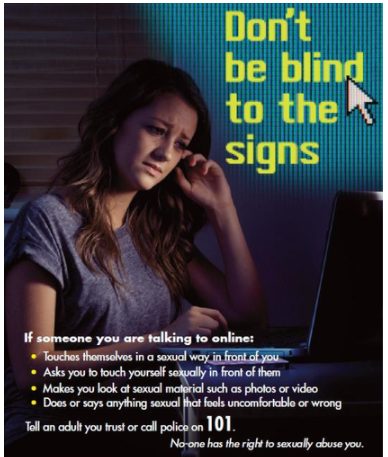
The world today is riddled with multiple issues. COVID-19 pandemic is not over yet and now the Russia-Ukraine war is threatening to turn into World War III. Amidst all this, the safety of our youth has taken a backseat. Young people today, including high school graduates, college students, and recent graduates, are facing various types of danger, including cyberbullying, online sexual predation, and other types of harassment.
The Pew Research Center has released a report that states 95% of American teens are online, and 78% of these teens use social media. This means that the vast majority of America’s youth is susceptible to different types of online abuse and harassment.
According to the National Crime Prevention Council, “Young people are especially vulnerable to becoming victims of crime. They may be more likely to be victimized because they are easier targets (they may not be as strong as an adult, they may not know how to defend themselves, or they may not think someone will believe them if they do report a crime), or because they may engage in risky behaviors.”
Crime prevention experts say that young people need to be taught how to protect themselves from crime and violence. Unfortunately, many schools do not have enough funds to provide such safety education.
Many school districts are reluctant to talk about sexual assault and other types of violence, for fear of offending parents and community members. This means that many young people are not getting the information they need to stay safe.
Schools also need to do more to address cyberbullying. A study by the Cyberbullying Research Center found that “35 percent of students who were bullied online reported that the bullying had a negative effect on their schoolwork, 32 percent reported that it had a negative effect on their social lives, and 24 percent reported that it had a negative effect on their mental health.”
What kind of safety threats does our youth face?

- Cyberbullying: According to iSafe, cyberbullying is “the use of technology to harass, threaten, embarrass, or target another person.” This can include sending mean text messages or emails, posting hurtful comments on social media, and spreading rumours online.
- Online sexual predation: Predators often use the internet to find victims. They may pose as someone they’re not online, or they may use social media to gain the trust of young people. Once they have gained the trust of their victim, they may try to persuade them to meet in person, or they may blackmail them into sending explicit photos or videos.
- Other types of harassment: Harassment can take many different forms, such as name-calling, teasing, and physical assault. It can be very damaging to a young person’s mental health and self-esteem.
- Academic challenges: Education and career have taken a backseat due to the COVID-19 pandemic. This is impacting the future of youth and leading them to anxiety and depression. We need to take immediate measures to prevent the academic, physical, and emotional challenges our youth is facing.
- Depressing news: On one hand, media creates social awareness. On the other hand, it inflicts fear, anxiety, and stress. The way news is delivered nowadays, especially to young people is mostly sensationalized for ratings which trigger these negative emotions and could have long-term effects on their mental health.
- Mental health threats: Social distancing and living in isolation due to the COVID-19 pandemic is already a mental health challenge for people of all ages. The lack of face-to-face social interaction can lead to loneliness, depression, and anxiety. For young people, this can be especially dangerous, as they may not have the skills or resources to deal with these feelings.
How to counter cyberbullying?
According to stopbullying.gov, there are several things that young people can do to protect themselves from cyberbullying, including:
- Block the person who is bullying you. This will prevent them from being able to contact you online.
- Tell a trusted adult about what is happening. They may be able to help you get the bullying to stop.
- Keep your personal information private. Do not share your address, phone number, or school name online.
- Delete mean messages and posts. This will make them harder for the bully to find and share with others.
- Report cyberbullying to the website or app where it is happening. This will help get the bullying stopped.
How to protect our youth from online sexual predators?

The best way to protect our youth from online sexual predators is to educate them about the dangers of meeting strangers online and teach them how to identify red flags. Young people should be taught not to share personal information with strangers, and to always tell a trusted adult if they feel unsafe or uncomfortable online.
Parents should also be vigilant about what websites their children are visiting, and be sure to install internet filters and parental controls on all devices that are used in the home. College and university students should be made aware of the dangers of online sexual predation and should be encouraged to use caution when meeting people online.
How to protect yourself from physical assault and other types of harassment?
If you are being harassed or assaulted, there are several things that you can do to protect yourself. You can:
- Tell someone you trust what is happening. They may be able to help you get the harassment to stop.
- Keep a record of the incidents, including the date, time, and description of what happened.
- Take screenshots of any harassing messages or posts.
- Report the harassment to the website or app where it is happening.
- If you are being physically assaulted, try to get away from the person and find a safe place to go. If you are not able to get away, try to use self-defense techniques to protect yourself.
- If you need help, you can contact a local rape crisis center or domestic violence shelter. They will be able to help you find safety and support.
In 2022, we need to assess the impact of technology on the physical, emotional, and social well-being of our youth. In the meantime, we should take these precautions to help our youth stay safe and healthy.
How to keep your studies and career on track in face of natural or man-made disasters?

TutorHelp.Club experts offer some excellent advice on how to keep your academic life on track despite any disruptions caused by unforeseen events such as pandemics or terrorist attacks.
- Stay connected: Even if classes are cancelled, it is important to stay connected to your instructors and classmates. You can do this by using online tools such as email, chat, or social media.
- Set up a study schedule: When classes are cancelled, it can be easy to fall behind. Make sure to set up a study schedule and stick to it.
- Get help if you need it: If you are struggling with your coursework, don’t hesitate to reach out for help. There are many resources available, such as tutors, online courses, assignment help, and even podcasts.
- Don’t panic: It is natural to feel overwhelmed during a crisis, but try not to panic. Stay organized and focused, and take things one step at a time.
We hope that these tips will help you stay on track during difficult times. TutorHelp.Club is here to help you with every kind of academic challenge.
Tips to watching news sensibly and know what’s true and what’s not
We have all heard the saying, “believe nothing you hear and only half of what you see.” It is important to be skeptical when watching the news, especially in these times of “fake news” and alternative facts. Here are a few tips for watching the news sensibly:
- Check the source: Make sure that you are checking the source of the news story. reputable sources will have an author and a website.
- Look for corroborating evidence: If a news story is sensational, likely, it is not true. Look for corroborating evidence from other sources to verify the story.
- Beware of clickbait headlines: Clickbait headlines are designed to get you to click on the story, without providing any real information. Be skeptical of any headline that promises a “shocking” or “explosive” story.
- Check the date: Make sure that the story is recent. If it is an old story that is being recycled, there is a good chance that it is not true.
- Use common sense: If something sounds too good to be true, or if it contradicts everything you know about the world, it is probably not true. Trust your gut instinct and use your common sense when assessing news stories.
We hope these tips will help you discern fact from fiction when watching the news.
Tips to keep yourself sane during insane times
We are living in crazy times. Every day, it seems like there is another bombshell story or outrageous tweet to deal with. It can be hard to keep your sanity when the world feels so insane. Here are a few tips to help you keep your cool during these difficult times:
- Don’t overload yourself: It is important to remember that you can only do so much. Don’t try to read every news story or keep up with every tweet. Pick and choose the stories that are most important to you, and let the rest go.
- Unplug: Take a break from the news and social media. Go for a walk, read a book, or take a nap.
- Talk to someone: Talk to your friends and family about what is going on. They can be a great source of support.
- Stay positive: It can be hard to stay positive when everything around you seems so negative, but it is important to try. Remember that there is always light at the end of the tunnel.
We hope these tips will help you stay sane during these crazy times.



0 responses on "Are We Able to Protect Our Youth? Safety and Harassment in Modern Times!"